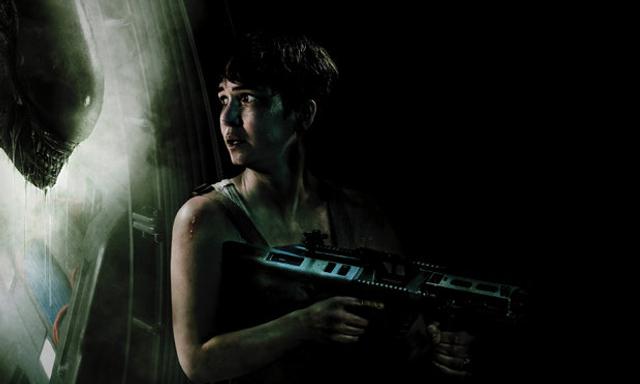In an interview with Cinefastique, Alien director Ridley Scott recalled a story in the mid-'70s when he and Walter Hill watched Texas Chainsaw Massacre for the first time.
As Scott tells it, he and producer / writer Walter Hill were sitting in Fox's screening room, just as they were beginning pre-production for what could become Alien. "I’d never actually seen it before," said Scott.
"Funnily enough, as a child I was brought up not to see horror movies, because my parents classified them along with sex movies. I saw this poster in Piccadilly of the guy in the face mask with the buzz saw, and I just decided not to see the film. So now I’m making movies, and I’m sitting in Fox, and Texas Chainsaw is running. Walter Hill came in behind me and said, ‘What are you looking at all this stuff for? Why don’t you get on with it?’ He had a large Coca-Cola and a hamburger, just as the film began, and when it finished, he hadn’t eaten the hamburger, and the Coca-Cola glass was warm in his hand – he hadn’t touched that either."
There's two interesting points here that had a clear impact on Alien and, subsequently, the entire horror genre - the idea of sex and horror overlapping each other, and more pointedly, the sheer level of violence on display. Scott regularly cites Texas Chainsaw Massacre as one of the three films that influenced Alien, the other being 2001: A Space Odyssey and Star Wars. While the production design and special effects owe debts to these two, it's the disturbing nature of Alien that stems from Tobe Hooper's masterpiece of grand guignol horror.
Up until Alien, most horror films were reasonably predictable and staid affairs. There was the haunted house horror film, the slasher horror film, the supernatural horror film and the folk horrors. Films like Mario Bava's Planet Of The Vampires toyed with the idea of a horror set in space, whilst Philip Kaufman's Invasion Of The Bodysnatchers worked more towards 'hard' science-fiction and psychological horror than outright horror and broader sci-fi, but nobody had tried to mesh the two together - and certainly not as successful as Ridley Scott had done.
A lot of what made Alien so effective in both the horror aspects and making it a convincing world was the incredible design work by HR Giger, who designed the xenomorph and the bio-mechanical lair from which it springs forth. A lot of Giger's work had a deep line of sexuality running underneath it, something that appealed to Scott's sensibilities about what Alien could be. Much has been made of the Facehugger which attacks John Hurt, and its connotations to male rape and violent impregnation. Moreover, the entrance to the alien ship is shaped like a vagina. While the production design might have made this creative choice, it wasn't done on its own.

Screenshot from Alien, in which the crew of the Nostromo enter the downed alien ship through familiar-looking doorways.
In an interview in 2002, screenwriter Dan O'Bannon made clear his intentions about what Alien was. "One thing that people are all disturbed about is sex... I said, 'That's how I'm going to attack the audience; I'm going to attack them sexually. And I'm not going to go after the women in the audience, I'm going to attack the men. I am going to put in every image I can think of to make the men in the audience cross their legs." In fact, Giger was specifically recommended for the design of the alien by O'Bannon, after the two worked on the ill-fated adaptation of Dune with Alejando Jodorowsky directing.
Aside from the subversive nature of the horror, what made Alien so effective was its casting. At the time of production, Sigourney Weaver was 29 - the youngest in the cast. Tom Skerritt, who played Captain Dallas, was 45. Ian Holm, who played the android Ash, was 48. Harry Dean Stanton was 53. These weren't young teenagers, out for fun and kicks in a creepy wood, like so many countless horror films - then and now. They were adults with lives, children, families, working a job with a grimace and arguing over their paycheques.

John Hurt, who played Kane, was 39 at the time of filming Alien.
As Roger Ebert described in his review, "these are not adventurers but workers, hired by a company to return 20 million tons of ore to Earth." This, in turn, made the characters less disposable to the audience and more invested in them. They didn't deserve what was happening to them and made the violence towards them more unjust. They were simply ordered to set down on the planet and investigate by a far-off corporate paymaster who was unconcerned with their eventual fate - which is truly horrific.
The lasting impact of Alien isn't just restricted to the blending of science-fiction and horror, although that's certainly a big part of it. What made Alien so revolutionary was how it approached horror in a truly unique way, layering it with subtext and challenging the order and tropes of the genre. The alien didn't attack women, it attacked men and did so in a truly violent and sexually provocative way. They weren't kids running around space, they were grown men and women with real stakes. Most explicitly was how they all eventually met their end, again in the tradition of Grand Guignol and taking cues from Texas Chainsaw Massacre.
Thirty-eight years on, Alien is still effective as a horror film and showcases just how revolutionary it was for the entire genre.
Alien: Covenant is in cinemas from May 12th.





















































































